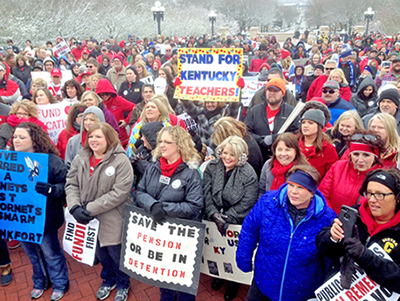STILLWATER, Okla. — The next showdown in the battle pitting teachers and other school workers against state governments is shaping up in Oklahoma. As the April 2 strike deadline approaches, support is building and preparations put in place. Inspiration from the West Virginia strike victory, where members in different unions stood together and organized a broad social movement in a nine-day walkout, has mobilized workers here.
“This is the right thing to do,” teacher Alberto Morejon told members of the Socialist Workers Party when we met him at the school baseball field here March 16. “We haven’t had a raise in 10 years. The state has cut funding, teachers are leaving and classroom sizes are getting bigger.”
Morejon, 25, teaches U.S. history and coaches baseball at Stillwater Junior High. He said teachers have to buy their own supplies, poster board, Kleenex, copy paper. His wife buys books for her classroom.
“I was watching what was going on in West Virginia and made a Facebook page ‘Oklahoma Teacher Walkout — The Time is Now!’” he said. “In a week and half over 70,000 teachers have joined, tons of them from West Virginia and Kentucky.”
At a March 8 press conference, the Oklahoma Education Association, the biggest union for teachers and other school workers in the state, announced that if the state legislature doesn’t meet their demands by April 1, the schools will shut down the next day. Days later, the Oklahoma Public Employees Association voted to join the teachers.
Preparations for the strike are underway. “All 10 of the biggest school districts will shut down the schools,” Morejon said. Hundreds of people stood up and applauded when the Stillwater school board voted unanimously March 14 to close their schools.
In Tulsa, many teachers are organizing to “work the contract,” putting in the stipulated seven hours and 50 minutes per school day, but refusing to stay for after school programs or to take work home.
Morejon and other teachers we talked to said there is widespread support for their fight from the students.
Oklahoma workers hit hard
Oklahoma workers have been hard hit by today’s crisis of capitalist production and jobs. Wages are low, unions are weak. Life is affected by the ups and downs of the oil industry, which accounts for some 25 percent of jobs in the state.
When a glut in oil meant prices plummeted a couple years ago, over 21,000 workers were laid off statewide. The downturn meant state tax revenue tanked, and state workers, including teachers, were targeted for more cuts. In 2016 some $47 million was cut from the state education budget.
Going door to door in Madill, visiting the union offices in Oklahoma City, talking to workers and customers at McDonald’s and meeting teachers outside schools before coming to Stillwater, we learned the looming strike is a big discussion.
And there is a widespread debate among working people on how increases in funds for schools and pay could be won. Both Democratic and Republican legislators say the only way a raise could come about would be to raise taxes on workers. One worker at McDonald’s got a good response when he said the oil bosses should pay, not the workers.
Since 2008, funding for public schools has decreased by nearly 9 percent, while student enrollment has increased. Adjusted for inflation, the state’s general funding for schools is down 28 percent per student since 2008.
In the Mannford Early Childhood Center, the thermostat is set at 63 degrees and many lights are turned off throughout the day to save money. In about 100 districts, mostly rural, schools are open only four days a week.
Oklahoma ranks second lowest in the country in teachers pay, according to the National Education Association. Many teachers have to work second jobs to get by — at Walmart, the airport or driving for Uber.
“On April 2, schools will close across the state and thousands of teachers and state workers will come to Oklahoma City,” said Doug Folks, communications specialist for the union. “The success of West Virginia emboldened our members to see that it’s possible.”
At a press conference March 15, the Oklahoma City school superintendent outlined plans for how the district will deliver meals for the students by bus during the walkout. The city’s Parks and Recreation Department will extend opening hours and the City Zoo will have daily daylong camps for younger children.
“I’m on board. They deserve it. They treat the kids like their own,” said Judith Lawler, a Unit director of the Oklahoma City Boys and Girls Clubs. “The food bank is gearing up. They have been putting boxes of food together for the kids to take home. The clubs will be open from 7:30 a.m. to 7 p.m. so the kids aren’t left by themselves while the teachers are fighting for what they deserve.”
School workers protest nationwide
More than 1,000 Kentucky teachers and supporters rallied outside the Capitol in Frankfort March 21, protesting threatened government attacks on state workers’ retirement pay. Five school districts in the state shut down to facilitate workers going.
In Arizona, where average wages are only slightly higher than in Oklahoma, teachers are gearing up for a fight. Arizona Educators United, a closed Facebook group, has gotten 34,000 members across the state in just a couple weeks.
They have organized “Red for Ed” days when teachers have worn red T-shirts to school, and organized a rally outside the Capitol in Phoenix March 14. Now they are building for a big rally March 28 there.


